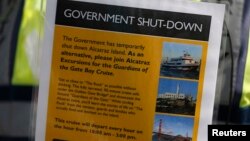SHANGHAI —
China on Wednesday said the U.S. government shutdown had exposed “the ugly side of partisan politics” in Washington and expressed concern about its effect on the world economy.
An editorial on the state-run Xinhua news service, considered a channel for Beijing's official views, said, “The United States, the world's sole superpower, has engaged in irresponsible spending for years.”
The commentary said the shutdown might lead to the U.S. failing to meet its debt obligations, referring to a similar conflict in 2011 over raising the government's debt ceiling. While default was ultimately averted, the crisis resulted in Standard & Poors downgrading the rating of U.S. sovereign debt.
“In the view of the latest political failure, a replay of the 2011 summer drama seems likely, which is certainly a concern for U.S. foreign creditors,” it said.
China is the largest single holder of U.S. government debt, a side effect of its managed exchange rate policy, which requires it to purchase massive amounts of dollars from Chinese trading companies to hold back the yuan from appreciating.
China's foreign exchange reserves stood at $3.58 trillion in the third quarter.
The policy of buying up U.S. government debt has come in for increasing criticism at home, given the relatively low yields and the fact that the relative value of Chinese holdings has decreased as the Federal Reserve has continued to pour cash into money markets through its quantitative easing policy, putting downward pressure on the value of the dollar.
The yuan has continued to appreciate this year both in absolute and trade-weighted terms, causing domestic concerns that the yuan's strength, in particular vis a vis neighboring currencies, will damage China's export competitiveness even as its economic recovery remains uncertain.
Beijing has made moves to liberalize its currency and let the yuan strengthen, in part to help its economy restructure to focus more on domestic consumption, but most mainstream economists believe exports will continue to play a critical role for years to come.
The U.S. shutdown went into its second day on Wednesday with no end in sight to the funding battle in Congress that triggered it. Major stock markets and the dollar fell.
Chinese popular opinion appears mixed, with some microbloggers praising the U.S. political system for having checks and balances that would allow for the government to close. In China, they argued, a government shutdown would lead to immediate national collapse.
Others, however, appeared less sympathetic, concurring more with the tone of Xinhua's line.
“With no political unity to redress its policy mistake, a dysfunctional Washington is now overspending the confidence in its leadership,” the editorial said.
It also complained of the immediate impact on foreign tourists.
Reports on Xinhua on Wednesday quoted Chinese tourists complaining that they had taken advantage of a national holiday week in China to visit the United States, only to find many of its historic sites, museums and national parks closed.
An editorial on the state-run Xinhua news service, considered a channel for Beijing's official views, said, “The United States, the world's sole superpower, has engaged in irresponsible spending for years.”
The commentary said the shutdown might lead to the U.S. failing to meet its debt obligations, referring to a similar conflict in 2011 over raising the government's debt ceiling. While default was ultimately averted, the crisis resulted in Standard & Poors downgrading the rating of U.S. sovereign debt.
“In the view of the latest political failure, a replay of the 2011 summer drama seems likely, which is certainly a concern for U.S. foreign creditors,” it said.
China is the largest single holder of U.S. government debt, a side effect of its managed exchange rate policy, which requires it to purchase massive amounts of dollars from Chinese trading companies to hold back the yuan from appreciating.
China's foreign exchange reserves stood at $3.58 trillion in the third quarter.
The policy of buying up U.S. government debt has come in for increasing criticism at home, given the relatively low yields and the fact that the relative value of Chinese holdings has decreased as the Federal Reserve has continued to pour cash into money markets through its quantitative easing policy, putting downward pressure on the value of the dollar.
The yuan has continued to appreciate this year both in absolute and trade-weighted terms, causing domestic concerns that the yuan's strength, in particular vis a vis neighboring currencies, will damage China's export competitiveness even as its economic recovery remains uncertain.
Beijing has made moves to liberalize its currency and let the yuan strengthen, in part to help its economy restructure to focus more on domestic consumption, but most mainstream economists believe exports will continue to play a critical role for years to come.
The U.S. shutdown went into its second day on Wednesday with no end in sight to the funding battle in Congress that triggered it. Major stock markets and the dollar fell.
Chinese popular opinion appears mixed, with some microbloggers praising the U.S. political system for having checks and balances that would allow for the government to close. In China, they argued, a government shutdown would lead to immediate national collapse.
Others, however, appeared less sympathetic, concurring more with the tone of Xinhua's line.
“With no political unity to redress its policy mistake, a dysfunctional Washington is now overspending the confidence in its leadership,” the editorial said.
It also complained of the immediate impact on foreign tourists.
Reports on Xinhua on Wednesday quoted Chinese tourists complaining that they had taken advantage of a national holiday week in China to visit the United States, only to find many of its historic sites, museums and national parks closed.




